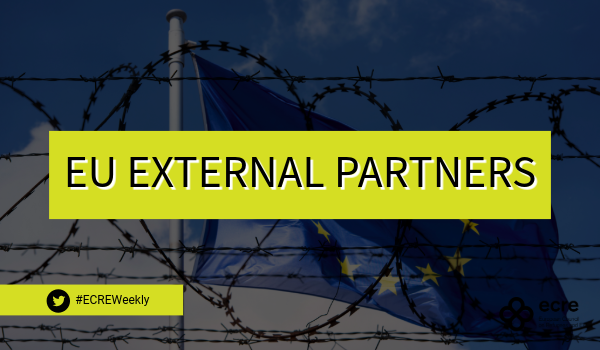- Amnesty International and Human Rights Watch have flagged the escalated restriction of free speech in Tunisia.
- The European Commissioner for Jobs and Social Rights has claimed that there was no consultation on the EU’s migration deals with Egypt and Tunisia.
- EU foreign ministers have agreed to reactivate the EU’s border assistance mission (EUBAM) in Rafah and Italy has resumed its funding for the United Nations Agency for Palestinian Refugees (UNRWA).
- The EU has pledged € 2 billion in support for Syrian refugees and maintained its position that Syria is ‘unsafe for return’ but Lebanon is stepping up its efforts in the opposite direction.
Amnesty International and Human Rights Watch have highlighted Tunisian authorities’ disregard for freedom of expression and constraints on press freedom. “By attacking journalists and other media figures, Saied’s government is moving to put the last nail in the coffin of Tunisia’s civic space,” said Lama Fakih from Human Rights Watch. The authorities have been accused of unjustly arresting journalists and activists that question the regime, including civil society groups defending migrants and refugees’ rights. The EU has also asked for clarification on the arrests. “Tunisian authorities are methodically annihilating two of the last remaining gains of the 2011 revolution: freedom of expression and the press,” said Heba Morayef from Amnesty International. The two international NGOs have called on the Tunisian authorities to immediately “release the detainees and drop all charges for expressions of opinion protected under international human rights law”.
The European Commissioner for Jobs and Social Rights Nicolas Schmit, who recently called for the revision of the EU-Tunisia migration deal, has claimed that neither he nor his commissioner colleagues were consulted on it. Schmit, who is also the leading candidate for the Party of European Socialists in the 2024 European Parliament elections, told the Vanguardia newspaper, that European Commission (EC) President Ursula von der Leyen never consulted his team on either the Egypt and Tunisia deals. “If there was [consultation], I would have absolutely voted against it,” he said. Although the EC’s chief spokesperson, Eric Mamer, has refuted Schmit’s claims, Schmit has maintained that the Tunisia deal was not discussed in the Commissioners’ weekly meeting. “This remains the key issue, together with the fact that we obviously do not agree with this deal as it does not guarantee respect for human rights,” he told EUobserver in a written statement. In a separate interview, Schmit told Euractiv that he might be open to the externalisation of migration procedures outside the EU under specific conditions. “If externalising means that sometimes you could organise, but under our control, under European control, migration procedures before people come into the European Union, that could be discussed”.
On 27 May, EU foreign ministers had a meeting with their counterparts from Saudi Arabia, Egypt, Jordan, Qatar and the United Arab Emirates. EU High Representative for Foreign Affairs and Security Policy Josep Borell said the meeting represented “a real political discussion” that he had not seen in a while. After the meeting, Borell announced that the EU was planning to restart its border assistance mission (EUBAM) in Rafah that has been dormant since 2007. “I have the green light from EU [foreign] ministers to reactivate the Rafah border mission,” he said. He also cautioned that the reactivation of EUBAM Rafah would require co-operation from Egypt, Palestine and Israel.
Italy has joined the list of countries that have resumed their funding for the United Nations Agency for Palestinian Refugees (UNRWA). Foreign Minister Antonio Tajani announced € 5 million would go to UNRWA projects, with another € 30 million destined for Italy’s ‘Food for Gaza’ initiative.
At the eighth Brussels Conference on ‘Supporting the future of Syria and the region’, the EU pledged more than € 2 billion to help displaced Syrians and maintained its position that returns are still not possible due to the country’s ongoing political instability. “While the European Union would wish that returning home could be a realistic option for all refugees, everywhere and always, we concur with the United Nations system that currently the conditions for safe, voluntary and dignified returns to Syria are not in place,” said EU High Representative Josep Borrell. The funding is intended to support both Syrians inside Syria and those in neighbouring countries, as well as their host communities in Türkiye, Lebanon, Jordan and Iraq. The EU’s recent funding pledge came just a few weeks after the EU signed a € 1 billion migration deal with Lebanon. On 28 May, a day after the Brussels Conference, Lebanese Prime Minister Najib Mikati said that for the first time Lebanon had a “clear and specific action plan” on the Syrian refugee issue which included a cabinet committee to “negotiate directly with the Syrian government” and speed up repatriation processes. “During the conference, Lebanon emphasized the need for support and aid to encourage the Syrians to return to their country,” said Mikati. On the same day, about 1,000 Syrians living in the Batroun region of northern Lebanon were reportedly evicted. Amnesty International has urged the EU to press the EU-funded Lebanese authorities to “immediately cease their unprecedented crackdown on Syrian refugees”.
Related articles
- EU EXTERNAL PARTNERS: Investigative Journalists Accuse EU of Complicity in Migrant ‘Dumping’ in North African Countries ― EU Commissioner says Migration Deals Need to be ‘Revised’ ― UN Urges Tunisia to Stop Harassing Migrants and NGOs ― Another Anti-migrant Protest Takes Place in Tunisia ― Tunisia Negotiating ‘Voluntary’ Migrant Return Deals With Other African Countries, May 2024
- EU EXTERNAL PARTNERS: Member States Push for Outsourcing of Migration Procedures to Third Countries ― EU Signs € 1 Billion Migration Deal with Lebanon ― Tunisian Authorities Expel Hundreds of Migrants to Border with Algeria ― Migrants Released from Detention in Libya, May 2024

